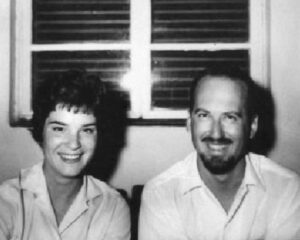Gerry A. Hale
1933 - 2022

Gerry Hale, a long-time, much-loved professor in the Department of Geography at the University of California, Los Angeles, died on October 14, 2022.
Born in 1933 in Los Angeles, Gerry (pronounced “Gary”) was raised in the neighboring city of Glendale. He attended UCLA as both an undergraduate and graduate student. In the early 1960s, while conducting fieldwork in Sudan, Gerry served as the Head Geography Master at Unity High School for Girls in Khartoum and as a Visiting Lecturer at the University of Khartoum. Before and after his time in Sudan, he also taught at the University of Southern California. In 1966, working under the direction of Dr. Joseph Spencer, he completed his Ph.D. dissertation on agricultural terracing in Sudan’s Darfur region. Soon thereafter, he joined the UCLA Department of Geography as a tenure-track faculty member.
A political and cultural geographer, Gerry’s teaching and research focused on technology, nationalism, the state, cultural hegemony, capitalism, anti-colonialism and empire, and Marxist geography. His regional specializations were in North Africa, the Middle East, and California.

A combination of factors—ranging from witnessing pervasive racial injustice in Glendale and exposure to the early years of postcolonial life in Lebanon (where he studied as a M.A. student) and in Africa, to the horrors of the U.S. war in Vietnam—radicalized Gerry. By the late 1960s, he saw himself as Marxist—politically as well as intellectually.
Consistent with his politics—a combination of democratic socialism, feminism, and anti-racism—Gerry was involved in Antipode: A Radical Journal of Geography from its initial days. As the journal’s structure became more formalized, he served on the editorial board from 1978 to 1985.
Gerry’s politics also underlay his intense dedication to students. He was the advisor to approximately a dozen Ph.D. students who went on to academic careers, and to scores of Master’s students—in Geography as well as in the African Studies M.A. Program, for which he served as director for some years, and in the Center for Near Eastern Studies. He was also the Department of Geography’s undergraduate and graduate advisor during the 1990s. In these roles Gerry was known to be a strong supporter of women faculty and students.
Because of his politics, life at UCLA in Gerry’s earlier years as a faculty member were often difficult given the strongly conservative ethos that permeated the institution. Changing times and, more importantly, Gerry’s generous spirit, ethical character, collegiality, and dedication as a teacher of undergraduate and graduates alike eventually won over most, if not all, of his detractors. By the time of his retirement circa 1997, Gerry was a highly valued and universally appreciated citizen of the Department and the University as a whole; he was a member of some of the most prestigious bodies on campus, such as the Committee on Privilege and Tenure.
A strong sense of justice motivated much of what Gerry Hale did as a geographer. Many of those who were fortunate enough to take an undergraduate course with him, for example, learned about what happened to the predominately working class and Mexican-descended community of Chavez Ravine. Beginning in 1951, the City of Los Angeles used eminent domain to expel the area’s residents and raze their homes—in the name of public housing which never arrived. Instead, years later, the city sold the land to the Los Angeles Dodgers to build a baseball stadium.
As one former student, now a historian, recalled in relation to Gerry’s telling of the story, “When I was growing up in Echo Park (a Los Angeles neighborhood), I didn’t know this history. I don’t think most people know it today. I learned it once I got to UCLA, in a geography class with Gerry Hale. He was not even a Chicano, but a white man who engaged in a one-man boycott of Dodger Stadium, having made a personal commitment to never go to ballgames because of what had happened on the land on which Dodger Stadium sits.”
Gerry Hale is survived by his longtime partner, Sondra Hale, professor emeritus of Anthropology and Gender Studies at UCLA, and their daughters, Alexa and Adrienne, as well as by countless others whose lives he touched.
Provided by Garth Myers (Trinity College) and Joseph Nevins (Vassar College).